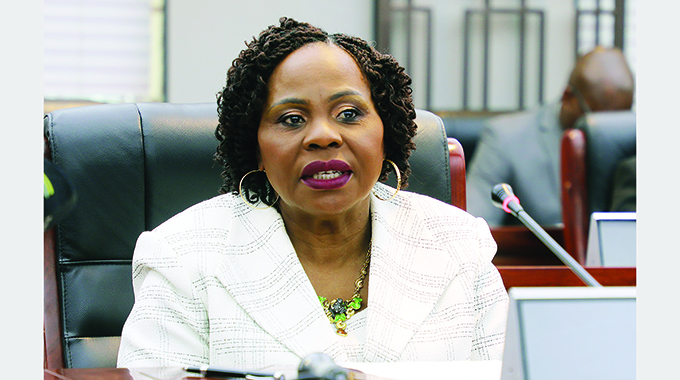‘Beitbridge transformation boon for regional trade’

Thupeyo Muleya,Beitbridge Bureau
The ongoing transformation of the Beitbridge Border Post at a cost of US$300 million will go a long way in cementing Zimbabwe’s position as a vital player in regional and international trade, Minister of Information, Publicity and Broadcasting Services, Monica Mutsvangwa has said.
She commended the Government for automating services and separating traffic which has helped address efficiency challenges that had become perennial at the country’s and SADC’s busiest inland port.
The border is being upgraded in three phases which include, the freight terminal and ICT facilities (Phase 1), bus terminal, and the private motor vehicles and pedestrian terminal which fall under phases 2 and 3 respectively.
So far the freight and bus terminals have been completed and President Mnangagwa has since commissioned the massive infrastructure development project. Since the opening of the freight terminal in October last year, the turnaround for the clearance of commercial cargo has improved from 24 hours to three hours.
In an interview on the sidelines of the commissioning of the project by the Head of State, Minister Mutsvangwa said the Government had done well in terms of infrastructure development and the implementation of Zimbabwe is open for business mantra.
“Projects like the Beitbridge Border Modernisation we are seeing here is cementing our position as a country in terms of trade facilitation,” said Minister Mutsvangwa.
“As you are aware South Africa is one of our biggest trade partners and it’s pleasing to see the face of our border changing like this to boost cross-border trade between the two countries and other Sadc countries”.
She said the new traffic flow at the border had helped eliminate delays which saw trucks and people spending days at the border due to recurrent delays. The Minister said a lot of infrastructure development was happening across Zimbabwe because the Second Republic had opened up space for local and foreign investment.
Zimborders Consortium is transforming the border under a private-public partnership (PPP) arrangement with the Government.
The organisation’s general manager, Mr Nqobile Ncube said under the current set up they are able to clear 60 percent of commercial cargo arriving at Beitbridge.
He said they were working on clearing at least 90 percent of the cargo upon completion of all three border terminals by the end of November this year.
“Ideally the border post is being transformed under three main pillars was transformed which include the separation of traffic, automation, and building efficiencies,” said Mr Ncube.
“There was a need to create traffic separation. You will recall that in the old border setup, all stakeholders were piled up in one hall. Despite your different needs you would be lumped in one setup and be treated in the same way. That created a problem in services delivery”.
With the creation of the three terminals, border authorities were now offering customised services to each type of traffic and the plan was bearing fruits.
It is estimated that the Zimbabwe Revenue Authority (Zimra) is now able to collect more than $600 million in consolidated fund revenue at the border daily due to imported services delivery. Mr Ncube said following the automation of services, the human interface between border authorities and clients that creates room for rent-seeking activities was gradually being eliminated.
He said at a later stage they will be introducing another module called the automated number plate reader. Automation, he said, was also leaving an ability for border authorities to electronically audit their processes and take corrective measures where necessary.
“So far commercial traffic through Beitbridge is peaking from 300 trucks daily during Covid-19 related lockdown to around 900 daily.
We anticipate the figure to increase to over 1200 trucks since they are now offering premium quality services at Beitbridge,” said Mr Ncube.
Chairperson of the border modernisation project subcommittee on ICT, Mr Shami Moyo who is also Zimra’s Director of ICT said they were now optimising traffic flows systems on phase two of the project (bus terminal).
“Phases one and two are complete and now as Government agencies, we now need to do our best to optimise the flow of traffic, just like what we did eventually when we opened the freight terminal last year,” said Mr Moyo.
“We had teething challenges of cargo piling up by then and we have optimised and things have improved for the better. We learned a lot of things from that experience.
“So, at the moment, we are working on the traffic flow for the bus terminal and private motorists’ terminals. We have documented the traffic floor process so that travels get they get to know the traffic flow and avoid confusion when coming in”.
In terms of harmonising operations with South Africa, they are using the pre-clearance systems which have proved to be effective.
Under this facility, cargo is cleared and duties are paid before it reaches the port of entry or exit and only checked for compliance.
This is opposed to starting the whole customs clearance process at the port of entry which delays the smooth flow of traffic.
“We are also using the single widow clearance facility where all Government agencies have access to information and this limits the red tape that hinders the flow of cargo through our borders,” added Mr Moyo.
“We are moving well with technology and automation of the border systems is one of the best even though there are still some areas that need attention,” said a freight forwarder Mr Innocent Ramatswana Moyo.
“For example delayed online response by Zimra especially the queries and amendments section which is causing delays in the movement of trucks.
“Secondly, we feel a secured parking bay for clearing agents is needed especially considering that we operate 24hrs, in most cases, we find our cars broken in by thieves while we are conducting business in the customs area”.
A light cross-border transporter, Mr Emanuel Timirepi said they were happy about the separation of traffic which was improving the way of doing business through the border post.
According to the chairperson of the Beitbridge Business Expo, Dr Anna Muleya, the transformation of the border was a critical move to address barriers to trade within the SADC region.
She said in the last few years some transporters were now opting to use other borders to avoid delays at the Beitbridge Border Post.
“This is a great move and we applaud it because those inefficiencies in the border are choking our businesses, especially the Customs Clearing Industry which is the main commercial activity in the town,” said Dr Muleya.








Comments